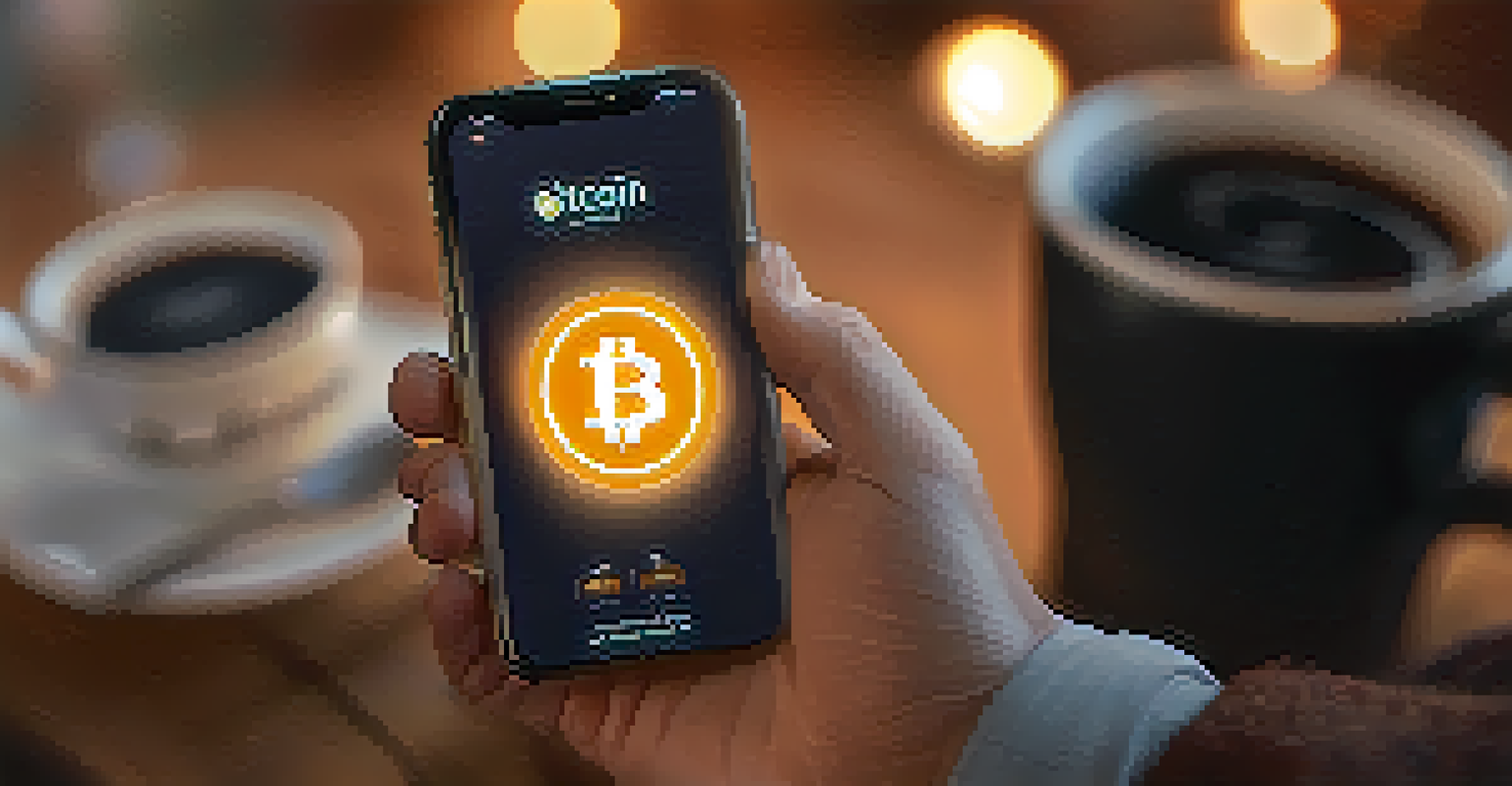The Role of Social Media in Bitcoin's Rising Popularity

Social Media: A Catalyst for Bitcoin Awareness
Social media platforms have become crucial in spreading awareness about Bitcoin. With millions of users sharing content, news about Bitcoin reaches a vast audience almost instantly. This viral nature helps demystify Bitcoin for many, making it more accessible.
Social media is not just a tool; it's a means to democratize information and empower individuals in their financial journeys.
For instance, platforms like Twitter and Instagram often feature influencers discussing Bitcoin, which can spark interest among their followers. This organic growth in awareness is vital, especially for newcomers who might be intimidated by traditional financial discussions.
Consequently, as more people become familiar with Bitcoin, its popularity continues to rise. Social media serves as a bridge, connecting potential investors with information and communities that support their learning journey.
Influencer Power: Shaping Bitcoin's Narrative
Influencers play a significant role in shaping perceptions of Bitcoin. When a well-known figure endorses Bitcoin, it can create a ripple effect, encouraging their followers to explore it. This phenomenon highlights the influence of social media personalities in the cryptocurrency space.

Take Elon Musk, for example; his tweets about Bitcoin have historically led to substantial price fluctuations. This showcases how a single post can rally interest and investment in Bitcoin, often leading to a surge in its value.
Social Media Boosts Bitcoin Awareness
Platforms like Twitter and Instagram help demystify Bitcoin, making it more accessible to newcomers.
Thus, the power of influencers on social media can’t be underestimated. They help create a narrative around Bitcoin that can either elevate or undermine its standing in the market.
Community Engagement: Building a Bitcoin Culture
Social media fosters a sense of community among Bitcoin enthusiasts. Platforms like Reddit and Discord host discussions where users share insights, strategies, and news. This communal aspect encourages learning and collaboration, making the Bitcoin experience more enriching.
The power of social media lies in its ability to connect communities and foster conversations that can shape the future of finance.
Moreover, these communities often organize events or campaigns that further promote Bitcoin. For example, the annual Bitcoin Pizza Day celebrates the first purchase with Bitcoin, reinforcing its cultural significance and history.
As a result, this strong sense of community not only keeps existing users engaged but also attracts newcomers. The welcoming environment lowers barriers to entry, making it easier for everyone to join the conversation.
Real-Time News: Keeping Bitcoin on the Radar
The fast-paced nature of social media allows for real-time updates on Bitcoin. Users can receive immediate news alerts about market trends, regulatory changes, or technological advancements. This instant access to information keeps Bitcoin at the forefront of discussions.
For instance, when there’s breaking news about Bitcoin regulations, tweets and posts flood timelines within minutes. This swift dissemination of information can lead to rapid market reactions, illustrating how social media can influence investor behavior.
Influencers Shape Bitcoin Perceptions
Well-known figures can significantly impact Bitcoin's popularity through their endorsements and social media presence.
Ultimately, this timely flow of information ensures that Bitcoin remains a hot topic. The ability to stay informed not only empowers existing investors but also intrigues potential newcomers looking to understand the market.
Education Through Engagement: Learning About Bitcoin
Social media serves as a powerful educational tool for Bitcoin. Many creators share informative content through videos, articles, and infographics that simplify complex concepts. This approach makes learning about Bitcoin more approachable for everyone.
Platforms like TikTok and YouTube have seen a rise in educational content focusing on Bitcoin basics, trading strategies, and investment tips. This kind of engagement is invaluable for those wanting to make informed decisions before diving into the world of cryptocurrency.
By breaking down intricate ideas into digestible formats, social media helps bridge the knowledge gap. This educational aspect contributes to Bitcoin's growing popularity and encourages informed participation in the market.
Meme Culture: Bitcoin's Fun Side
Meme culture has become intertwined with Bitcoin, adding a lighthearted twist to serious discussions. Memes can make complex topics more relatable and engage a broader audience. They often spread quickly, further elevating Bitcoin's visibility in pop culture.
For example, the 'Doge' meme became synonymous with Dogecoin but also touched on Bitcoin, showcasing how humor can draw attention. These playful representations make Bitcoin less intimidating and more approachable for newcomers.
Community Drives Bitcoin Engagement
Online communities foster collaboration and learning, making the Bitcoin experience more inviting for new users.
In this way, meme culture plays a unique role in promoting Bitcoin. It creates a fun atmosphere around investing in cryptocurrency, encouraging more people to join the conversation.
Social Media's Role in Bitcoin's Investment Trends
Investment trends in Bitcoin are often influenced by social media discussions. As users share their experiences and predictions, others are likely to follow suit, creating a bandwagon effect. This collective behavior can lead to significant price swings and market movements.
For instance, the surge in retail investment during 2020 and 2021 can be traced back to social media hype and discussions. New investors often turn to platforms like Twitter for guidance, looking to influencers and community leaders for advice.

Consequently, social media acts as a barometer for Bitcoin's market sentiment. Investors can gauge public interest and sentiment, which can significantly impact their investment decisions.